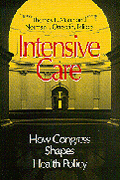The devastating and politically consequential defeat of President Clinton’s comprehensive health plan in Congress has unleashed a torrent of speculation over “who or what killed reform.” One class of explanation deals with the institutional arrangements by which policy is made in the United States and, more specifically, with the rules and organization of Congress. This volume weighs the importance of Congress in the failure to enact health reform by examining more broadly how Congress shapes health policy—on matters ranging from ambitious plans to achieve universal health insurance coverage to annual appropriations for public health agencies.
Part One examines how Congress has organized and equipped itself to make health policy. Individual chapters consider how committee jurisdictions, budgeting procedures, information, and oversight influence health policymaking. Part Two uses recent health policy episodes—the 1988-89 adoption and repeal of Medicare catastrophic coverage and the 1993-94 failure to pass national health reform—to generalize about how process shapes policy.
This book is a product of the Renewing Congress Project, a joint undertaking of the Brookings Institution and the American Enterprise Institute. The contributors include C. Lawrence Evans, College of William and Mary; Mark Nadel, General Accounting Office; Julie Rovner, freelance health policy writer; and Allen Schick and Joseph White, Brookings.
Copublished with the American Enterprise Institute
Thomas E. Mann is a senior fellow in Governance Studies at the Brookings Institution, where he holds the W. Averell Harriman Chair. He is a frequent media commentator on American politics.

